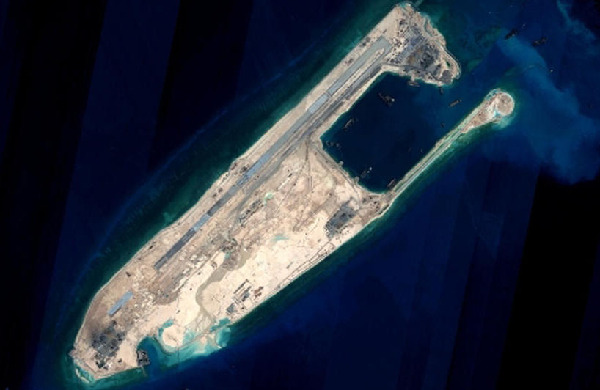Breaking neutrality in the name of impartiality
- By Shen Dingli
 0 Comment(s)
0 Comment(s) Print
Print E-mail China.org.cn, August 5, 2015
E-mail China.org.cn, August 5, 2015
|
|
|
Satellite image shows the Yongshu reef of the Nansha Islands after a land reclamation project in south China. The land reclamation project of China's construction on some stationed islands and reefs of the Nansha Islands will be completed as planned soon. |
Speaking at the 5th South China Sea Conference at CSIS in Washington DC on July 21, the US Assistant Secretary of State for East Asia and Pacific Affairs, Daniel Russel, indicated that "We are not neutral when it comes to adhering to international law. We will come down forcefully when it comes to following the rules. We the United States are obligated to protect US interests".
Among the aforementioned three sentences, he is sincere about two of them, especially, "We are obliged to protect US interests." In addition, he is telling the truth that for protecting US interests, "We are not neutral when it comes to adhering to international law."
In terms of the track record, everyone knows that the US is biased at least on the application of international law. When an international law doesn't serve American interest, the US tends to bypass or break it. These days, when its allies, say the Philippines, compete with China over territorial disputes in South China Sea, American government has claimed that both claimants shall abide by international law for the ongoing Manila's lawsuit against Beijing at the International Tribunal. Washington seems neutral on international law, but a close look indeed reveals that the US is not neutral at all – it clearly stands by the Philippines by breaking its long-claimed neutrality.
There are two types of disputes between China and the Philippines concerning the South China Sea. The first is about the sovereignty while the second economic rights associated with sovereignty. China has claimed that it is sovereign on all islands, islets and reefs on its side of the U-shaped lines. For ages its ancestors have discovered and explored them. Past Chinese governments have claimed and exercised possession of some of them for centuries, most recently in 1948 in a holistic way by announcing its U-shaped dash lines. The Manila authority has raised no counter-claim for nearly half a century, virtually admitting Chinese claim. The Philippines changed its constitution for the first time in 1997 to demand islands and reefs inside its exclusive economic zones (EEZ), eventually raising the dispute with China.
The 1982 UNCLOS indeed accords at least 200 nm of EEZ for all littoral states, but only for economic resources. The UNCLOS is never an instrument for sovereignty. Subsequently, the International Tribunal has been handling inter-state dispute over economic interests, but not for settling territory at all.
Even with the UNCLOS, China's claim over sovereignty of islands and reefs in the current disputed area is unchallenged. Some of these rock features may qualify as territorial waters, and under certain conditions, even their own EEZ. China's sovereign rights there shall never be disrupted by the making of UNCLOS. Should China's island-based EEZ overlap with that of the Philippines, the two sides shall talk to cut a deal for dividing their respective EEZs.






